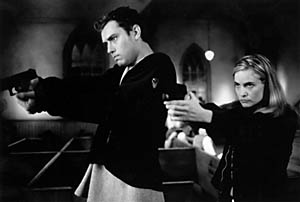The eXistenZ of Life

A Talk With Director David Cronenberg
David Cronenberg can't get comfortable. Apologizing for being fussy, he methodically tests two chairs before finally deeming one suitable for his troubled back. It's an ironic preoccupation for the Canadian viscount of viscera who, at least figuratively speaking, wants moviegoers to feel anything but comfortable with his latest film, eXistenZ. "They take their chances," says Cronenberg of his audiences. And so does this cerebral director, whose 1997 film Crash convened the unlikely topics of car wrecks and carnality to become a controversy magnet. ExistenZ, too, revisits familiar Cronenbergian obsessions —biology, sexuality, technology— yet also confronts what the director sees as enemy number one: mainstream Hollywood. "I fear there will be a time when audiences will not be able to even comprehend other kinds of movies," he says. "Hollywood is a very reactionary, conservative influence. I'm not saying it's a conspiracy or anything, but it seems like there's only one kind of movie in the world now, and that's the Hollywood movie." The effect, he reveals, hits close to home: "I worry that my audience is dwindling." Indeed, eXistenZ flies in the face of traditional, linear storytelling. The sci-fi adventure zips from reality to fantasy and back again as a genius game designer (Jennifer Jason Leigh) flees radical "Realists" who are out to destroy her creation, a virtual-reality game that plugs into humans and transports them into an elaborate dreamland. The notion of technology as an extension of the body is a consistent theme in the director's ouevré, from 1975's They Came From Within to 1986's The Fly. "The farther and farther you get away from your body," says Cronenberg, "the less and less real things are. So I keep coming back to [biology] as a source of power, as a source of creative energy." However, eXistenZ —Cronenberg's first original screenplay since 1983's Videodrome— was inspired from the real-life plight of author Salman Rushdie, whose writings made him the target of Iranian hard-liners. The two met in London, where they discussed whether or not a game could be art. "A game is maybe too democratic," says Cronenberg of their verdict. "The players have a lot of control. But in retrospect, in the same way that the technology of the industrial revolution generated cinema 100 years ago, the new technology of the computer is undoubtedly going to generate new art forms, and in some ways, it already has. Maybe there could be a strangely democratic kind of art form, a more collaborative kind of art form." Ironically, considering the director's disdain for mainstream moviemaking, the buzz around eXistenZ is that it's "Cronenberg Lite," a less blood-soaked, more audience-friendly manifestation of the auteur's vision. Still, the director, who dabbled in a few rounds of MechWarrior and Myst to prepare for the film, insists he's as provocative as ever. "For a movie that has no sex in it, it has a lot of sex in it," he says. In fact, Cronenberg's game trades the phallic joystick of traditional game-playing with a module that's distinctly feminine: it's a fleshy pink "pod" that plugs into a man-made orifice at the base of the spine via an "UmbyCord." Part toy, part pet, the innovation gurgles to life with unmistakably masturbatory caresses and a flick of its nipple-like protuberances. Besides the cheeky sexual overtones, Cronenberg's film excoriates those who blame art and media for inciting real-life violence. "I'm presenting a sort of reverse moralizing by showing the flaws in the argument that people can't see the difference between fantasy and reality," he says. "The real truth is that you'd have to prove that somebody who was absolutely stable can walk into a movie and come out a killer, and that's ridiculous." Cronenberg, a self-described "card-carrying existentialist," brightens at the mention of a line from his earlier film, Videodrome: "It has a philosophy and that's what makes it dangerous." Yes, it's his philosophy, says Cronenberg, that separates his work from The Matrixes out there — and perhaps makes people a little nervous. "Most filmmaking has no philosophy whatsoever, other than just to be popular and to be there," he says. "That doesn't make it interesting, and it certainly doesn't make it dangerous. If something has a philosophy, it can change people's minds and their realities as well. "And change," he adds, "is not comfortable." |









